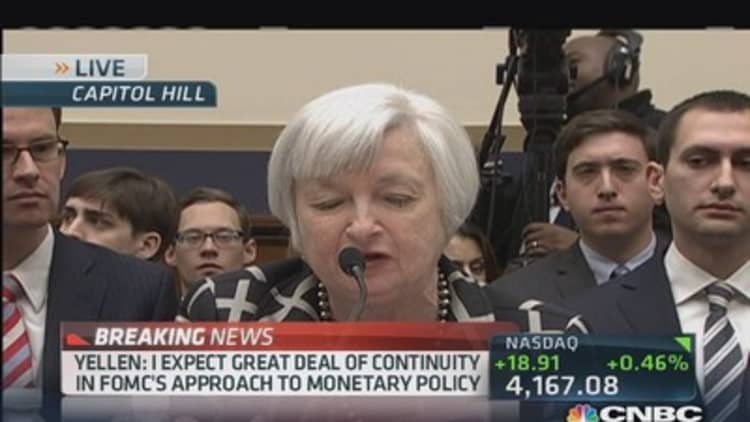
Federal Reserve Chair Janet Yellen promised on Tuesday a steady and consistent course forward, with less money printing but continued low rates.
In her first public remarks since taking over for Ben Bernanke, Yellen sounded optimistic about the economy, including projections about unemployment and inflation.
"The economic recovery gained greater traction in the second half of last year," Yellen said, according to an advanced text of her statement she will present Tuesday to the House Financial Services Committee. She appears before the Senate Banking Committee on Thursday.
Click here for market reaction.
While she pointed out gains the economy has made in reducing unemployment, she said the current 6.6 percent rate is "well above levels" that the Fed finds "consistent with maximum sustainable employment."
Yellen also noted recent upset in the financial markets along with two straight months of weak jobs numbers.
"We have been watching closely the recent volatility in global financial markets," she said. "Our sense is that at this stage these developments do not pose a substantial risk to the U.S. economic outlook. We will, of course, continue to monitor the situation."
(Read more: Wicked winter puts big chill on job creation)
Yellen's speech comes as the U.S. central bank is looking to chart a course past its historically easy monetary policy.

Faced with an economy in recession and a financial system at the verge of collapse, the Fed in late 2008 began buying bonds in order to inject liquidity and to assure markets that it stood at the ready to backstop weakness.
The program, known as quantitative easing, has morphed into a monetary backstop for markets, helping keep bond yields low and stock market prices high. The has rallied more than 160 percent since touching its March 2009 lows.
However, concerns have grown that the Fed is supporting yet another asset bubble after the dotcom craze in the 1990s and the real estate market to kick off the 21st century.
The Fed at its past two meetings has voted to scale back the program, cutting it in $10 billion increments to where it stands now at $65 billion a month. While the third leg of QE has taken root, the central bank's balance sheet has soared past $4.1 trillion.
(Read more: 'This isn't your father's Fed': GOP congressman)
Yellen said the incremental cuts to QE likely would continue, though she insisted the Federal Open Market Committee was "not on a preset course" regarding the purchases.

"The Committee's decisions about their pace will remain contingent on its outlook for the labor market and inflation as well as its assessment of the likely efficacy and costs of such purchases," she said.
Though the unemployment rate is just a tick above the 6.5 percent target the Fed said it would use to gauge when interest rates should rise, Yellen stuck to that benchmark. The Fed also has used a 2.5 percent inflation level as a guidepost for rate increases.
However, she said it's likely that the Fed will have to keep rates near zero "well past the time" that unemployment crosses below the 6.5 percent threshold.
Ambiguity on the unemployment target could become a contentious point when Yellen engages in a question-and-answer session after delivering her remarks.
"Where's the Fed going with this forward guidance? Is it a rule?" Rep. Jeb Hensarling asked on CNBC Tuesday morning. "What good is forward guidance if when you reach a milepost you jettison it?" Hensarling, a Texas Republican, is chairman of the Financial Services Committee.
Yellen also said the Fed will be an active participant in increased bank regulation, specifically focusing on avoiding the too-big-to-fail problems that accompanied the financial crisis and required a massive Wall Street bailout that the Bernanke Fed helped orchestrate.
"Since the financial crisis and the depths of the recession, substantial progress has been made in restoring the economy to health and in strengthening the financial system," she said. "Still, there is more to do."
(Click here for a full text of Yellen's speech.)
—By CNBC's Jeff Cox. Follow him on Twitter @JeffCoxCNBCcom.


